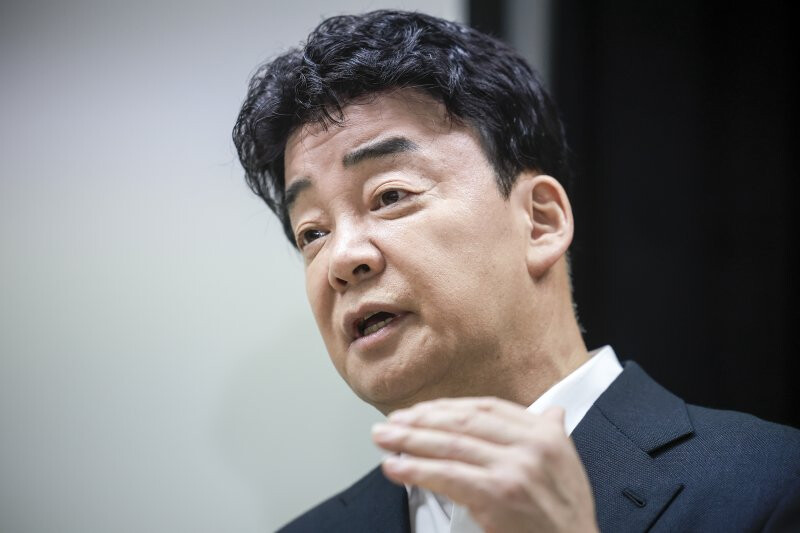
SEOUL, SOUTH KOREA – The fortunes of Theborn Korea, the prominent restaurant conglomerate helmed by celebrity chef and entrepreneur Baek Jong-won (59), have taken a sharp downturn, with its stock price struggling to recover from a series of damaging controversies. Following a promising initial public offering (IPO) in November of the previous year, which saw its stock price surge by 50% above the IPO price of 34,000 won on the back of robust earnings, the company has been beset by a cascade of negative publicity. Within a mere five months of its listing, the stock has halved from its peak, languishing at 27,300 won as of today's trading, a 19.7% decline from its initial offering price.
The troubles began earlier this year with consumer backlash over the pricing and pork content of Theborn Korea's ‘Baek Ham Gift Set’ during the Lunar New Year holiday. This was followed by a more serious legal entanglement in March, when the National Agricultural Products Quality Management Service (NAPQMS) launched a criminal investigation into CEO Baek for alleged violations of the Act on Origin Labeling of Agricultural and Fishery Products. The accusations center on the alleged mislabeling of foreign-origin ingredients in the company's ‘Baekseok Soybean Paste’ and the popular ‘Hanshin Pocha Stir-fried Octopus’ as domestically sourced.
Industry analysts and insiders attribute Theborn Korea's current predicament to a potent combination of ‘owner risk’ – a vulnerability inherent in businesses heavily reliant on the personal brand and reputation of their leader – and the structural weaknesses prevalent within the franchise sector.
"Baek Jong-won's immense individual influence undeniably fueled the rapid growth and successful IPO of Theborn Korea's various brands," commented CEO A of a major meat franchise, speaking on condition of anonymity. "However, this outsized influence has now manifested as significant owner risk." Echoing this sentiment, CEO B of a Korean food franchise noted, "The intense public scrutiny that comes with an owner's celebrity status means that Baek Jong-won's personal issues directly translate into problems for the entire corporation."
Concerns have also been raised regarding the concentration of power within Theborn Korea, with Baek Jong-won holding a commanding 60% stake in the company, significantly higher than the 37.8% average for controlling shareholders of major South Korean listed companies reported by the Korea Chamber of Commerce and Industry. "In the franchise industry, the very nature of growth often involves a charismatic founder personally recruiting franchisees and staff, fostering a culture where the leader's directives are perceived as absolute," explained CEO A. "Baek Jong-won's considerable authority within the company likely created an environment where internal checks and balances were weak or non-existent."
Adding to the company's vulnerabilities is its low proportion of directly operated stores. These flagship locations are crucial for standardizing operational processes for new brands and gathering direct feedback from the market. However, Theborn Korea operates a mere 14 directly managed outlets across its 25 franchise brands, representing a paltry 0.4% of its total 3,066 franchise locations, according to regulatory filings with the Financial Supervisory Service. "Without a significant number of directly operated stores, it becomes exceedingly difficult for the headquarters and the CEO to truly understand the challenges and gather meaningful feedback from franchisees running actual businesses on the ground," stated CEO C of a prominent pub franchise.
In an attempt to address the mounting concerns, Baek Jong-won personally apologized to shareholders at the annual general meeting on March 28th. "We are undertaking a comprehensive review of our internal systems from the ground up," Baek stated, pledging to "strengthen our origin management system, collaborate with external experts to enhance transparency, and establish an effective internal monitoring system."
Despite these assurances, the market remains cautious, and the long-term impact of these controversies on Theborn Korea's brand reputation and future performance remains uncertain. The case serves as a stark reminder of the inherent risks associated with companies heavily reliant on a single individual's persona and the critical need for robust governance structures within rapidly expanding franchise businesses.
[Copyright (c) Global Economic Times. All Rights Reserved.]






























